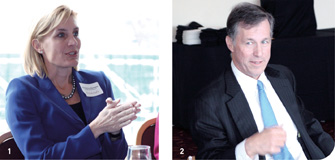
1. One impact of corporate leadership on the region, said Christine Kemper, has been the contribution of business to raising the profile of the arts throughout the community. | 2. Peter Brown cited the contributions of leaders like the late Stan Durwood, but lamented the lack of a broader community mindset that encourages even the largest businesses to get bigger.
The evidence of leadership is all around us: A revitalized Downtown. A thriving life-sciences sector. National recognition for outsized philanthropy. A closer examination of those tangible products of leadership—whether it was driven by corporate executives, personal and family wealth or public-sector figures—tells us much about Kansas City, said nearly a score of current leaders gathered for the first Industry Outlook Assembly featuring past honorees of Ingram’s 40 Under Forty program.
To understand how that leadership is successfully applied, it helps to know about the philosophic and character underpinnings of the leadership that defines this region.
Leadership Assets
“Kansas City is so fortunate, from an entrepreneurial spirit standpoint, to have great companies like Hallmark and H&R Block and J.E. Dunn,” said Troy Stremming, vice president at Ameristar Casinos. “You have all these huge companies that were started and founded here and we’ve seen such a huge commitment on behalf of those founders in investing this community and continuing to do all the right things.”
Those legacy companies are being followed by upstarts like BATS Global Markets, whose chief operating officer, Chris Isaacson, said the boldness factor was clearly evident here. Six years ago, it was unheard of that a small company from Kansas City could shake up the equities-trading world and challenge the dominance of the New York Stock Exchange and NASDAQ. And yet, it’s happened with BATS, and that’s reflective of the broader community mindset, Isaacson said. “Whether through naivete or maybe out of boldness, we’re able to tackle things that are bigger than most people would,” he said.
Peter Brown of Grassmere Partners, who formerly served as chief executive for AMC Entertainment, noted the impact of a typically Midwestern level-headedness at work here. “That’s what contributes to the environment, to be able to raise a family and live comfortably here,” he said. We have also benefitted from the leadership of figures like the late Stan Durwood, Brown’s predecessor at AMC. “He had a lot to do with what happened in Downtown Kansas City; he was a very one of a kind, though. He kind of had a force of will that isn’t adopted by a lot of the other business leaders in town, and that force was that we’re going to do things, were going to get bigger, we’re going to acquire others and do it right here from Kansas City.”
“Fortunately, my company is willing to go out and find a lot of people and train them to become great leaders,” said Bob Dunn of J.E. Dunn Construction. “Some stay on for a lifetime, others go out and start their own companies, but it’s great that we have the talent pool that we have in this community, and that we have great academic institutions, whether public or private, that really help grow business.”
As an executive with Jeff Smith & Associates, Adam Taff says he’s spent the better part of the past six years working with clients from the East Coast. “Based on what I’ve seen in New York, we have a genuine, inherent goodness about us, and about our desire to help our community,” he said, and to do so without the kinds of egos that complicate things back east.
Christine Kemper cited the benefits bestowed by corporate leaders who have acknowledged the vital role that a thriving arts community plays in creating a vibrant city. “It’s very exciting that business people aren’t now afraid to talk about the arts as important to the economic welfare of the community,” she said.
Surprisingly, a key leadership trait can be found in the value of simply being decent and respectful in our relationships with others. Debbie Wilkerson, chief executive for the Greater Kansas City Community Foundation, said her dealings with executives from around the nation often touch on a common theme: You people in Kansas City are nice to work with, and that’s not always the case, she’s heard time and again. “It’s that added plus that nobody ever thought would be,” Wilkerson said.
Julie Browne, president and CEO of PPO USA, a division of Government Employees Health Administration, said that in her role, “we work with more national partners than local, so we constantly have people coming in to visit us from all parts of the country, and that is what they say: ‘Everyone is so nice here’ and they appreciate us. The working relationship is more of a trusting relationship.”
In a similar vein, Richard Wetzel, co-founder of Centric Projects, said “we have a humility and lack of arrogance that allows us to punch above our weight as a community.”
So What's Missing?
One would think that with so much going for it, Kansas City would be a trouble-free zone. But the panelists just as readily noted the leadership gaps—and potential gaps—that exist.